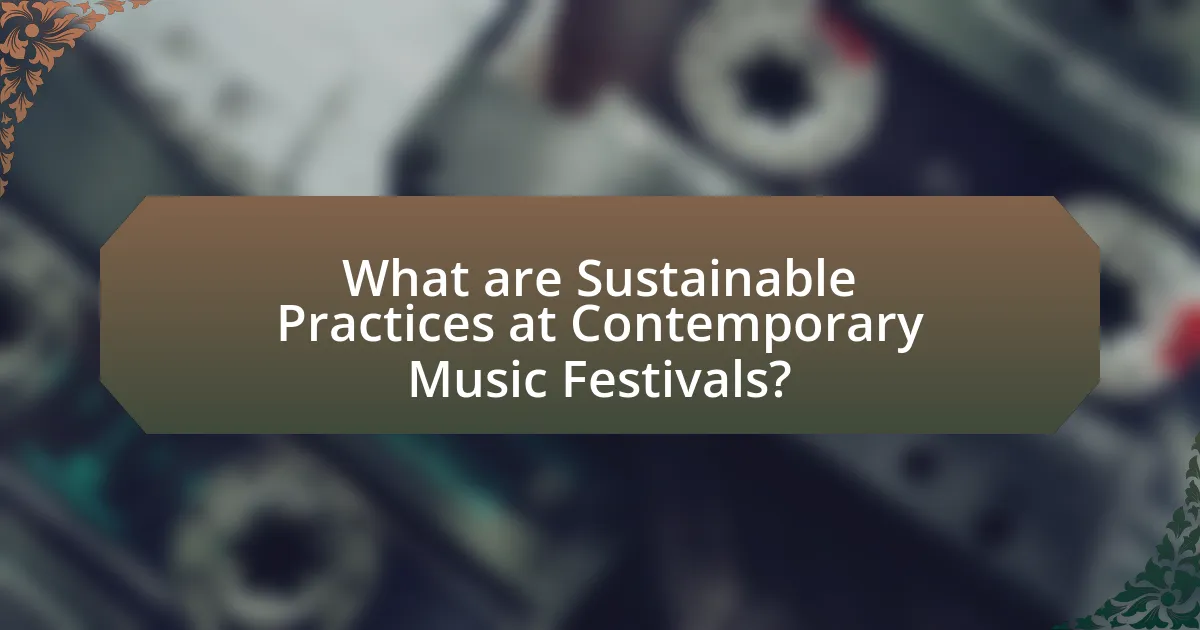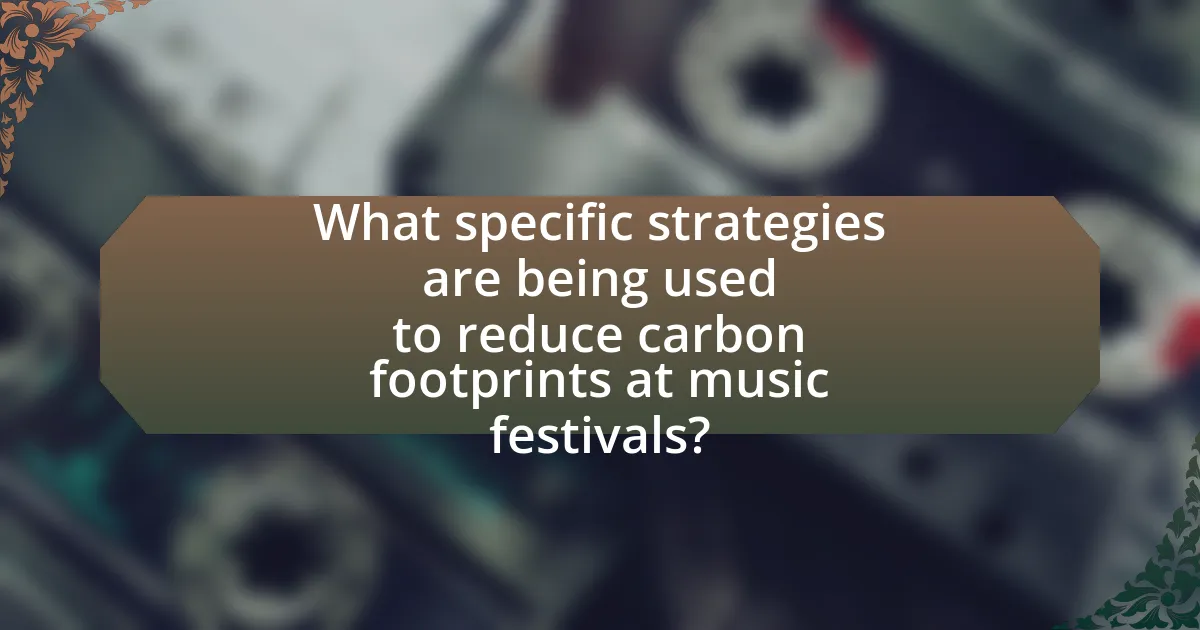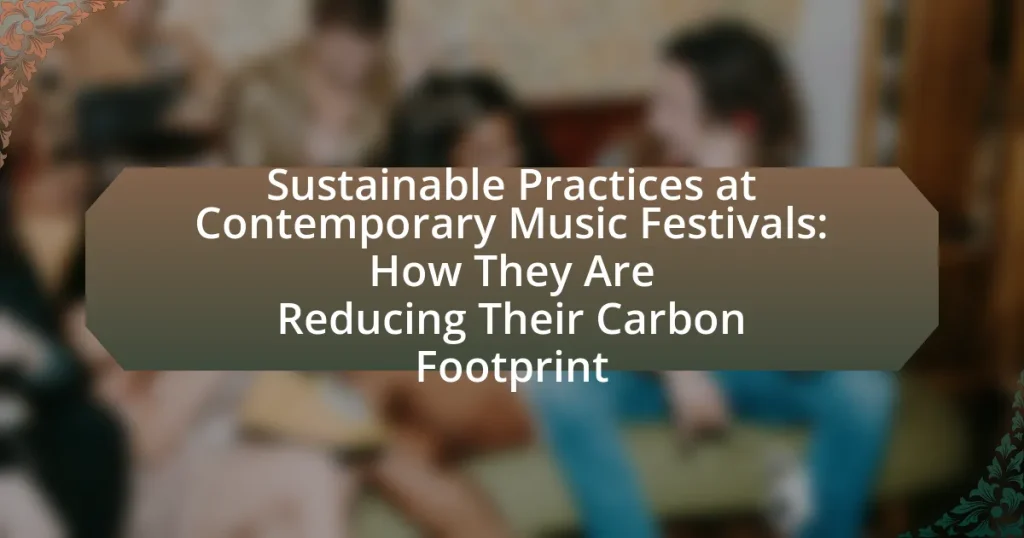Sustainable practices at contemporary music festivals focus on reducing carbon footprints through waste management, renewable energy use, and eco-friendly transportation options. Festivals like Glastonbury and Coachella have implemented strategies such as recycling, composting, and utilizing solar and wind energy to power their events, significantly lowering their environmental impact. Additionally, initiatives promoting public transport, carpooling, and biking contribute to decreased carbon emissions associated with attendee travel. The article explores how these practices align with broader environmental goals, the challenges faced in implementation, and the financial implications of adopting sustainable measures within the festival industry.

What are Sustainable Practices at Contemporary Music Festivals?
Sustainable practices at contemporary music festivals include waste reduction, renewable energy use, and eco-friendly transportation options. Festivals implement waste management strategies such as recycling and composting to minimize landfill contributions; for example, the Glastonbury Festival has achieved a 50% reduction in waste sent to landfills through these initiatives. Additionally, many festivals utilize solar panels and wind turbines to power stages and facilities, significantly lowering their carbon emissions. Transportation sustainability is enhanced by promoting carpooling, public transit, and bike access, as seen at events like Coachella, which encourages attendees to use shuttles and bicycles. These practices collectively contribute to a reduced carbon footprint and promote environmental awareness among festival-goers.
How are music festivals defining sustainability in their operations?
Music festivals are defining sustainability in their operations by implementing eco-friendly practices such as waste reduction, renewable energy use, and sustainable transportation options. For instance, many festivals now utilize solar panels to power stages and facilities, significantly decreasing their reliance on fossil fuels. Additionally, festivals are adopting comprehensive recycling and composting programs, with events like Glastonbury reporting a recycling rate of over 50%. Furthermore, initiatives to encourage public transport and carpooling among attendees help to minimize carbon emissions associated with travel. These measures collectively contribute to a lower carbon footprint and promote environmental awareness among festival-goers.
What specific practices are being implemented to promote sustainability?
Contemporary music festivals are implementing specific practices such as utilizing renewable energy sources, promoting waste reduction through recycling and composting, and encouraging sustainable transportation options. For instance, festivals like Glastonbury have committed to using solar panels and wind turbines to power their events, significantly reducing their reliance on fossil fuels. Additionally, many festivals have adopted zero-waste policies, aiming to divert at least 90% of waste from landfills through comprehensive recycling and composting programs. Furthermore, initiatives like incentivizing carpooling and providing shuttle services help minimize carbon emissions associated with attendee travel. These practices collectively contribute to a substantial decrease in the carbon footprint of music festivals.
How do these practices align with broader environmental goals?
Sustainable practices at contemporary music festivals align with broader environmental goals by significantly reducing carbon emissions and promoting ecological awareness. For instance, the implementation of renewable energy sources, such as solar panels, decreases reliance on fossil fuels, directly contributing to global efforts to combat climate change. Additionally, waste reduction initiatives, like composting and recycling programs, help minimize landfill contributions, supporting the goal of a circular economy. According to a report by the International Energy Agency, transitioning to renewable energy can reduce greenhouse gas emissions by up to 70% in the energy sector, underscoring the effectiveness of these practices in achieving environmental objectives.
Why is reducing the carbon footprint important for music festivals?
Reducing the carbon footprint is important for music festivals because it minimizes environmental impact and promotes sustainability. Music festivals often attract large crowds, leading to significant energy consumption, waste generation, and greenhouse gas emissions. For instance, a study by the UK-based organization Julie’s Bicycle found that the average music festival can produce around 1,000 tons of carbon dioxide emissions, primarily from transportation, energy use, and waste. By implementing strategies to reduce their carbon footprint, festivals can contribute to climate change mitigation, enhance their reputation among environmentally conscious attendees, and set a positive example for the industry.
What are the environmental impacts of traditional music festivals?
Traditional music festivals have significant environmental impacts, primarily through waste generation, energy consumption, and carbon emissions. These festivals often produce large amounts of waste, with studies indicating that an average festival can generate over 1,000 tons of waste, much of which is not recycled. Additionally, the energy required for stages, lighting, and sound systems typically relies on fossil fuels, contributing to greenhouse gas emissions. For instance, a report by the UK-based organization A Greener Festival found that festivals can emit up to 1,000 tons of CO2, equivalent to the annual emissions of 200 cars. Furthermore, the influx of attendees can lead to habitat disruption and increased pollution in surrounding areas.
How does a reduced carbon footprint benefit festival organizers and attendees?
A reduced carbon footprint benefits festival organizers and attendees by enhancing sustainability, reducing costs, and improving public perception. Festival organizers can lower operational expenses through energy-efficient practices and waste reduction, which can lead to increased profitability. For attendees, a smaller carbon footprint often translates to a more enjoyable experience, as festivals that prioritize sustainability typically offer cleaner environments and better amenities. Additionally, studies show that 70% of festival-goers prefer events that demonstrate environmental responsibility, which can boost attendance and loyalty.
What challenges do music festivals face in implementing sustainable practices?
Music festivals face significant challenges in implementing sustainable practices, primarily due to logistical complexities, financial constraints, and stakeholder engagement. Logistical complexities arise from the need to manage waste, transportation, and energy consumption effectively, which can be overwhelming given the scale of large events. Financial constraints often limit the ability of festival organizers to invest in sustainable technologies or practices, as initial costs can be high and return on investment uncertain. Additionally, engaging stakeholders, including vendors, attendees, and local communities, poses a challenge, as differing priorities and levels of commitment to sustainability can hinder cohesive efforts. These factors collectively impede the transition to more sustainable operations within the music festival industry.
What are the financial implications of adopting sustainable practices?
Adopting sustainable practices at contemporary music festivals can lead to significant financial implications, including cost savings, increased revenue, and enhanced brand value. For instance, implementing energy-efficient technologies can reduce utility costs by up to 30%, as evidenced by festivals that have transitioned to renewable energy sources. Additionally, festivals that prioritize sustainability often attract a growing demographic of environmentally conscious attendees, which can boost ticket sales and sponsorship opportunities. A report by the Green Music Initiative highlights that festivals adopting sustainable practices can enhance their marketability, leading to a potential increase in overall revenue by 15-20%. Thus, the financial implications of adopting sustainable practices are multifaceted, encompassing both immediate cost reductions and long-term revenue growth.
How do logistical issues affect the implementation of sustainability initiatives?
Logistical issues significantly hinder the implementation of sustainability initiatives at contemporary music festivals. These challenges include transportation inefficiencies, waste management difficulties, and resource allocation problems. For instance, inadequate transportation systems can lead to increased carbon emissions due to longer travel distances for attendees and supplies. Additionally, improper waste management can result in higher landfill contributions, undermining sustainability goals. A study by the University of California found that festivals with well-planned logistics reduced their carbon footprint by up to 30% compared to those with poor logistical planning. Thus, effective logistics are crucial for achieving sustainability in music festivals.
How are music festivals transitioning to more sustainable models?
Music festivals are transitioning to more sustainable models by implementing practices such as waste reduction, renewable energy use, and eco-friendly transportation options. For instance, many festivals are adopting zero-waste policies, which aim to divert at least 90% of waste from landfills through recycling and composting initiatives. Additionally, festivals like Coachella and Glastonbury have started utilizing solar panels and wind turbines to power their events, significantly reducing their reliance on fossil fuels. Furthermore, some festivals are encouraging attendees to use public transportation or carpooling, which helps lower carbon emissions associated with travel. These measures collectively contribute to a substantial decrease in the overall carbon footprint of music festivals.
What role do attendees play in promoting sustainability at festivals?
Attendees play a crucial role in promoting sustainability at festivals by actively participating in eco-friendly practices and influencing the overall environmental impact of the event. Their actions, such as using public transportation, reducing waste through recycling and composting, and supporting vendors that prioritize sustainable products, directly contribute to minimizing the festival’s carbon footprint. For instance, a study by the University of California found that festivals that engaged attendees in sustainability initiatives saw a 30% reduction in waste generation. By making conscious choices, attendees not only enhance their own experience but also foster a culture of sustainability that encourages organizers to adopt greener practices.

What specific strategies are being used to reduce carbon footprints at music festivals?
Music festivals are implementing several specific strategies to reduce carbon footprints, including the use of renewable energy sources, waste reduction initiatives, and sustainable transportation options. For instance, many festivals now utilize solar panels and wind turbines to power stages and facilities, significantly decreasing reliance on fossil fuels. Additionally, festivals are adopting zero-waste policies, encouraging recycling and composting, which can lead to a reduction in landfill waste by up to 90%. Furthermore, organizers are promoting public transportation, carpooling, and electric vehicle options for attendees, which helps lower emissions associated with travel. These strategies collectively contribute to a more sustainable festival experience while actively addressing climate change concerns.
How are renewable energy sources being integrated into festival operations?
Renewable energy sources are being integrated into festival operations primarily through the use of solar panels, wind turbines, and biofuels to power stages, lighting, and other essential services. For instance, festivals like Coachella and Glastonbury have implemented solar energy systems that significantly reduce reliance on fossil fuels, with Glastonbury generating over 50% of its energy from renewable sources. Additionally, many festivals are utilizing energy storage solutions to optimize the use of renewable energy, ensuring a consistent power supply throughout the event. This integration not only lowers carbon emissions but also promotes sustainability within the festival industry, aligning with broader environmental goals.
What types of renewable energy are most commonly used?
The most commonly used types of renewable energy are solar energy, wind energy, and biomass energy. Solar energy harnesses sunlight through photovoltaic cells, making it a popular choice for powering festival stages and equipment. Wind energy utilizes turbines to convert wind into electricity, providing a sustainable power source for large events. Biomass energy, derived from organic materials, is also utilized for generating electricity and heat, contributing to the overall reduction of carbon footprints at music festivals. These energy sources are increasingly adopted due to their sustainability and ability to significantly lower greenhouse gas emissions.
How does the use of renewable energy impact overall festival emissions?
The use of renewable energy significantly reduces overall festival emissions by replacing fossil fuels with cleaner energy sources. For instance, festivals that utilize solar panels or wind turbines can decrease their carbon footprint by up to 80%, as evidenced by the 2019 Coachella Valley Music and Arts Festival, which implemented solar energy solutions that contributed to a substantial reduction in greenhouse gas emissions. This transition not only lowers emissions but also promotes sustainable practices within the festival industry, encouraging other events to adopt similar renewable energy strategies.
What waste management practices are being adopted?
Contemporary music festivals are adopting several waste management practices to reduce their carbon footprint, including comprehensive recycling programs, composting initiatives, and waste diversion strategies. For instance, festivals like Glastonbury have implemented a “Green Policy” that emphasizes recycling and composting, achieving a diversion rate of over 50% of waste from landfills. Additionally, many festivals are utilizing biodegradable materials for food and beverage containers, further minimizing environmental impact. These practices not only enhance sustainability but also promote awareness among attendees about responsible waste disposal.
How are festivals reducing single-use plastics?
Festivals are reducing single-use plastics by implementing comprehensive waste management strategies, promoting reusable alternatives, and encouraging sustainable vendor practices. For instance, many festivals now provide water refill stations to minimize plastic bottle usage, while others have banned single-use plastic straws and cups, opting instead for biodegradable or reusable options. According to a report by the UK Music Industry, festivals like Glastonbury have successfully diverted over 1,000 tons of waste from landfills by adopting these measures, demonstrating a significant reduction in single-use plastic consumption.
What recycling and composting initiatives are in place?
Contemporary music festivals implement various recycling and composting initiatives to minimize waste and reduce their carbon footprint. For instance, many festivals provide clearly labeled recycling and compost bins throughout the venue, encouraging attendees to separate their waste effectively. Additionally, some festivals partner with local waste management organizations to ensure that recyclable materials are processed correctly. According to a study by the Green Music Initiative, festivals that adopt these practices can divert up to 70% of waste from landfills, significantly lowering their environmental impact.
How are transportation methods being improved for sustainability?
Transportation methods are being improved for sustainability through the adoption of electric and hybrid vehicles, enhanced public transit systems, and the promotion of alternative transportation options like cycling and walking. Electric vehicles reduce greenhouse gas emissions significantly; for instance, a study by the International Council on Clean Transportation found that electric cars can reduce emissions by up to 70% compared to traditional gasoline vehicles. Additionally, music festivals are increasingly partnering with local transit authorities to provide shuttle services, which decreases the number of individual cars traveling to events, further lowering carbon footprints. Furthermore, initiatives encouraging attendees to use bicycles or walk to festivals not only promote healthier lifestyles but also contribute to reduced traffic congestion and emissions.
What alternatives to traditional transportation are being promoted?
Alternatives to traditional transportation being promoted at contemporary music festivals include electric shuttles, bike-sharing programs, and public transit incentives. Electric shuttles reduce emissions compared to diesel buses, while bike-sharing programs encourage attendees to use bicycles, promoting a healthier and more sustainable mode of transport. Additionally, festivals often collaborate with local transit authorities to provide discounted or free public transportation options, further minimizing the carbon footprint associated with travel to and from the event. These initiatives collectively aim to enhance sustainability and reduce environmental impact during festivals.
How does improving transportation options affect carbon emissions?
Improving transportation options significantly reduces carbon emissions by facilitating the use of more efficient and sustainable modes of transport. For instance, enhancing public transit systems encourages individuals to opt for buses or trains instead of personal vehicles, which typically emit more greenhouse gases. According to the American Public Transportation Association, public transit saves approximately 45 million metric tons of carbon dioxide annually in the United States alone. Additionally, promoting cycling and walking through better infrastructure decreases reliance on fossil fuel-powered vehicles, further lowering emissions. Therefore, the development of diverse and accessible transportation options directly contributes to a reduction in overall carbon emissions.

What are the future trends in sustainable practices at music festivals?
Future trends in sustainable practices at music festivals include increased use of renewable energy sources, enhanced waste management systems, and the promotion of eco-friendly transportation options. Music festivals are increasingly adopting solar and wind energy to power their events, significantly reducing reliance on fossil fuels. Additionally, many festivals are implementing comprehensive recycling and composting programs to minimize waste, with some aiming for zero waste by diverting over 90% of materials from landfills. Furthermore, initiatives encouraging attendees to use public transport, carpool, or bike to festivals are gaining traction, as they help lower carbon emissions associated with travel. These trends reflect a growing commitment within the music festival industry to address environmental concerns and promote sustainability.
How are technology and innovation shaping sustainability efforts?
Technology and innovation are significantly shaping sustainability efforts by enabling more efficient resource management and reducing environmental impact. For instance, advancements in renewable energy technologies, such as solar and wind power, allow music festivals to operate with minimal reliance on fossil fuels, thereby lowering their carbon footprint. Additionally, innovations in waste management, like smart recycling systems and composting technologies, enhance waste diversion rates at events. According to a report by the International Energy Agency, the deployment of renewable energy sources could reduce global CO2 emissions by up to 70% by 2050, underscoring the critical role of technology in achieving sustainability goals.
What new technologies are being adopted to enhance sustainability?
New technologies being adopted to enhance sustainability at contemporary music festivals include solar energy systems, energy-efficient lighting, and waste management innovations. Solar energy systems allow festivals to harness renewable energy, significantly reducing reliance on fossil fuels. Energy-efficient lighting, such as LED technology, minimizes electricity consumption while maintaining visibility and ambiance. Additionally, advanced waste management technologies, including composting and recycling systems, help divert waste from landfills, promoting a circular economy. These technologies collectively contribute to lowering the carbon footprint of music festivals, aligning with global sustainability goals.
How can data analytics improve sustainability practices at festivals?
Data analytics can improve sustainability practices at festivals by enabling organizers to make data-driven decisions that optimize resource use and minimize waste. For instance, analyzing attendee behavior and preferences allows festivals to tailor services, reducing excess food and beverage waste by accurately predicting demand. Additionally, data analytics can track energy consumption patterns, leading to more efficient energy management and the integration of renewable energy sources. A study by the University of California found that festivals utilizing data analytics reduced their carbon emissions by up to 30% through improved logistics and resource allocation. This demonstrates that leveraging data analytics not only enhances operational efficiency but also significantly contributes to sustainability goals at festivals.
What collaborations are emerging in the festival industry to promote sustainability?
Emerging collaborations in the festival industry to promote sustainability include partnerships between festival organizers and environmental organizations, technology companies, and local governments. For instance, festivals like Glastonbury have teamed up with organizations such as the Green Party and various NGOs to implement waste reduction strategies and promote renewable energy use. Additionally, technology firms are collaborating with festivals to develop apps that encourage eco-friendly practices among attendees, such as carpooling and recycling. These collaborations are essential as they leverage expertise and resources to create more sustainable event practices, evidenced by the increased adoption of zero-waste initiatives and carbon offset programs across major festivals.
How are partnerships with environmental organizations influencing practices?
Partnerships with environmental organizations are significantly influencing sustainable practices at contemporary music festivals by providing expertise, resources, and frameworks for reducing carbon footprints. These collaborations often lead to the implementation of eco-friendly initiatives such as waste reduction programs, renewable energy usage, and sustainable transportation options. For instance, festivals like Glastonbury have partnered with organizations like the Green Party to adopt comprehensive waste management strategies, resulting in a reported 50% reduction in waste sent to landfills. Additionally, partnerships with groups like the Carbon Trust have enabled festivals to measure and offset their carbon emissions effectively, further promoting sustainability in the industry.
What role do sponsors play in supporting sustainable initiatives?
Sponsors play a crucial role in supporting sustainable initiatives by providing financial resources and visibility to projects aimed at reducing environmental impact. Their funding enables music festivals to implement eco-friendly practices such as waste reduction, renewable energy use, and sustainable transportation options. For instance, festivals like Coachella and Glastonbury have partnered with sponsors to enhance their sustainability efforts, leading to significant reductions in carbon emissions. In 2019, Coachella reported a 20% decrease in waste due to sponsor-supported recycling programs. This financial backing not only facilitates the execution of sustainable practices but also encourages other stakeholders to prioritize environmental responsibility.
What practical steps can festival organizers take to enhance sustainability?
Festival organizers can enhance sustainability by implementing waste reduction strategies, such as providing recycling and composting stations, and encouraging the use of reusable containers. These measures significantly decrease landfill waste; for instance, festivals like Glastonbury have reported recycling rates exceeding 50% through such initiatives. Additionally, utilizing renewable energy sources, such as solar or wind power, can lower carbon emissions. The Coachella Valley Music and Arts Festival has successfully integrated solar panels, which contribute to its energy needs, showcasing the feasibility of this approach. Furthermore, promoting sustainable transportation options, like public transit and carpooling, can reduce the carbon footprint associated with travel. The Electric Forest Festival has incentivized attendees to use shuttles, resulting in a notable decrease in vehicle emissions. By adopting these practical steps, festival organizers can significantly enhance their sustainability efforts.
